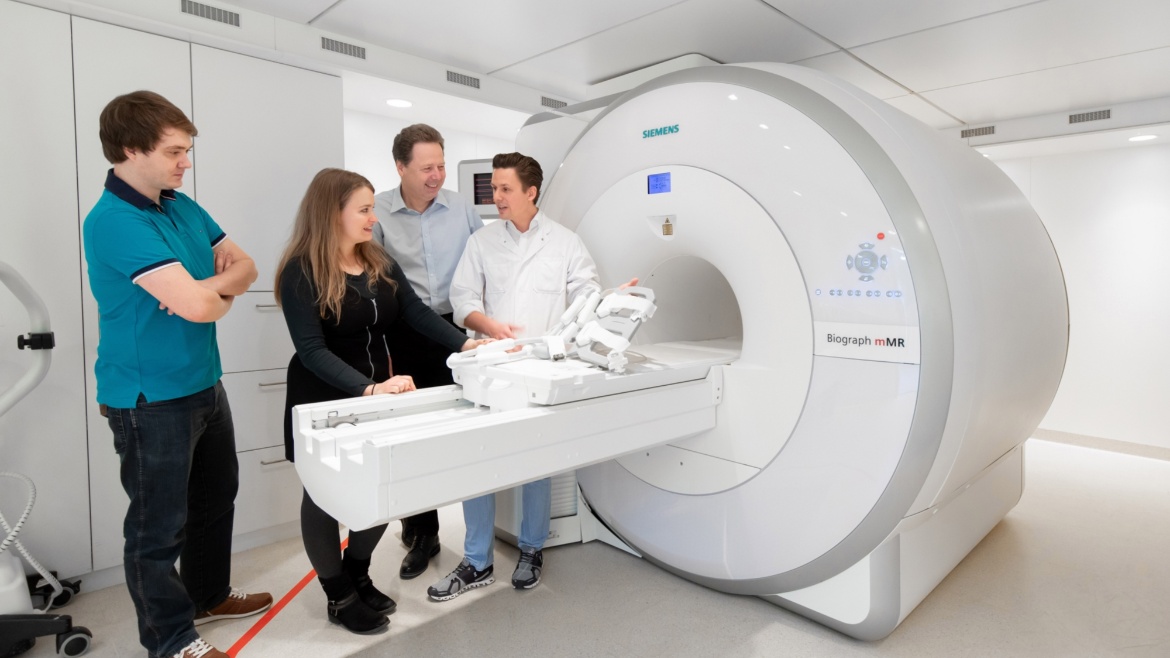A robot that examines humans and makes diagnoses is a scientific and technical dream and will remain so for the time being. However, artificial intelligence is already able to provide support for diagnostics and several relevant research projects are currently underway at the Insitute of Signal Processing and System Theory (ISS, headed by Prof. Bin Yang) at the University of Stuttgart.
Artificial intelligence (AI), which examines images of the human body in search of serious illnesses - for many people this thought is still likely to cause a frisson of discomfort. The knowledge and experience of doctors is too important for most people to leave their health in the hands of a machine, yet it seems as if the use of AI is booming in the medical field.
This is the point at which Annika Liebgott interjects: “I don't think doctors can be completely replaced and nor does anybody want that,” she says. Instead, the main goal is to provide physicians with good tools with which to do their work by means of AI. A total of four doctoral researchers and one postdoc are currently working at the interfaces between medicine and information technology at the ISS. The ISS is not only working on several projects in this area of specialization, for which the German Research Foundation (DFG) provides funding, but also maintains close collaborative ties with the Diagnostic and Interventional Radiology Department at the University Hospital of Tübingen.
Mechanization is creating new room for maneuver
From Liebgott's point of view, the interaction of medicine and engineering is extremely fruitful. Methodological studies on signal processing and machine learning are carried out at the ISS, with a particular focus on deep learning and AI in recent years. These methodological findings are subsequently applied to medical questions, which are then dealt with in close collaboration with the experts in Tübingen. “Although we are enthusiastic about the topic, we are not medical doctors,” explains the 29-year-old. “But in collaboration with Tübingen, we can always immediately check our results for their medical value.”

For example, the ISS is currently working on the detection of motion artifacts, which can be caused when patients inadvertently move during an MRI scan, among other things. One potential model going forward could be to detect disruptive movement artifacts during the scan and to re-record individual body parts. This would save costs and spare patients who would not have to be “popped back in the tube”. The ISS is also investigating the automatic correction of unavoidable motion artifacts, such as those caused by heartbeats.
Another project is dealing with immunotherapy for cancer patients. Using images taken before and after the start of treatment, the aim is to estimate how the course of treatment will develop. Annika Liebgott is convinced that “we can save radiologists a lot of time”. Whilst there are more images of the human body available today than ever before, it is still necessary to manually check the large number of image layers produced during an MRT scan. Preparing the images for use in relation to certain questions is also unavoidable every now and then. But the doctoral researcher is certain that “doctors have better things to do than to process images.” “The manual segmentation of organs, for example, is extremely time-consuming, which is why colleagues at the ISS are researching automated approaches using deep learning.” If the medical specialists could be relieved of routine tasks, it would not only reduce costs, but more importantly it would also leave them more time for their actual task, i.e., diagnosing illnesses.
Acceptance increases in line with the benefits
As Liebgott explains, this prospect of being able to concentrate more on one's own core competences was also a decisive factor in bringing about the collaboration with Tübingen. In the beginning, some radiologists were rather skeptical about AI. However, this has changed as a result of what they have experienced during the past few years: more and more often, doctors are approaching the signaling specialists for help with specific questions. Of course, the question of acceptance is also relevant to the affected patients. How will people react when artificial intelligence penetrates such sensitive areas as the diagnosis of severe diseases? “That will depend on the respective application,” says Liebgott adding that hardly anyone would resist a motion correction on the images but the more “machines” are involved in the actual diagnosis, the greater the concerns might be.
Doctors have better things to do than to process images.
Annika Liebgott
Yet in this context too, the researchers at the ISS emphasize the supporting function of AI and the realistic potential of the technology. A computer that could produce a complete diagnoses would first need to be trained using enormous amounts of data. However, the available data for rare diseases is much too scant for “training” a computer. It therefore makes much more sense to develop AI to such an extent that it can provide the diagnostician with hints and practical assistance. For example, if a doctor were to specifically examine the lungs of a patient, an algorithm could simultaneously parse the images of other organs and body parts for abnormalities.
In addition to the immunotherapy project, Annika Liebgott is currently investigating whether computer tomography can be used to visualize structures that have hitherto only been visible on positron emission tomography (PET) images. Since the patients have to be given substances labelled as being radioactive for the PET scan, the procedure is relatively stressful and the researcher hopes to be able to reduce the number of examinations that involve the use of such substances.
Jens Eber
Annika Liebgott, M. Sc.
Doctoral Candidate at the Institute of Signal Processing and System Theory (ISS), University of Stuttgart

